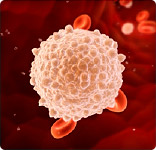
Immune system disorders cause abnormally low activity or overactivity of the immune system. In cases of immune system overactivity, the body attacks and damages its own tissues (autoimmune diseases). Immune deficiency diseases decrease the body's ability to fight invaders, causing vulnerability to infections.
Allergies and Asthma
Allergies result from the immune system's overreaction to a non-threatening foreign substance. Foods and inhaled particles like pollen and pet dander are the most common allergens (substances causing allergic reactions). When the immune system senses an allergen, it stimulates the release of chemicals such as histamine.
Symptoms of the resulting allergic reaction can include breathing problems, eye irritation, rash, nasal congestion, or nausea and vomiting. Antihistamine medications can reduce symptoms, but avoiding allergen exposure is the best preventive treatment for allergies.
Asthma is a condition in which the immune system becomes overactive in the airways (bronchi) in the lungs. People with asthma suffer periodic episodes of constriction of their airways (bronchospasm), making it harder to breathe. Most people with asthma also have ongoing inflammation in their airways. Asthma treatment sometimes includes a daily inhaled corticosteroid, which reduces immune system overactivity and inflammation.
Autoimmune Diseases
In response to an unknown trigger, the immune system may begin producing antibodies that instead of fighting infections, attack the body's own tissues. Treatment for autoimmune diseases generally focuses on reducing immune system activity. Examples of autoimmune diseases include:
Rheumatoid arthritis .
The immune system produces antibodies that attach to the linings of joints. Immune system cells then attack the joints, causing inflammation, swelling, and pain. If untreated, rheumatoid arthritis causes gradually causes permanent joint damage. Treatments for rheumatoid arthritis can include various oral or injectable medications that reduce immune system overactivity.
Systemic lupus erythematosus (lupus).
People with lupus develop autoimmune antibodies that can attach to tissues throughout the body. The joints, lungs, blood cells, nerves, and kidneys are commonly affected in lupus. Treatment often requires daily oral prednisone, a steroid that reduces immune system function.
Inflammatory bowel disease (IBD).
The immune system attacks the lining of the intestines, causing episodes of diarrhea, rectal bleeding, urgent bowel movements, abdominal pain, fever, and weight loss. Ulcerative colitis and Crohn's disease are the two major forms of IBD. Oral and injected immune-suppressing medicines can treat IBD.
Multiple sclerosis (MS).
The immune system attacks nerve cells, causing symptoms that can include pain, blindness, weakness, poor coordination, and muscle spasms. Various medicines that suppress the immune system can be used to treat multiple sclerosis.
Type 1 diabetes mellitus.
Immune system antibodies attack and destroy insulin-producing cells in the pancreas. By young adulthood, people with type 1 diabetes require insulin injections to survive.
Guillain-Barre syndrome.
The immune system attacks the nerves controlling muscles in the legs and sometimes the arms and upper body. Weakness results, which can sometimes be severe. Filtering the blood with a procedure called plasmapheresis is the main treatment for Guillain-Barre syndrome.
Psoriasis.
In psoriasis, overactive immune system blood cells called T-cells collect in the skin. The immune system activity stimulates skin cells to reproduce rapidly, producing silvery, scaly plaques on the skin.
Graves' disease .
The immune system produces antibodies that stimulate the thyroid gland to release excess amounts of thyroid hormone into the blood (hyperthyroidism). Symptoms of Graves' disease can include bulging eyes as well as weight loss, nervousness, irritability, rapid heart rate, weakness, and brittle hair. Destruction or removal of the thyroid gland, using medicines or surgery, is usually required to treat Graves' disease.
Hashimoto's thyroiditis .
Antibodies produced by the immune system attack the thyroid gland, slowly destroying the cells that produce thyroid hormone. Low levels of thyroid hormone develop (hypothyroidism), usually over months to years. Symptoms include fatigue, constipation, weight gain, depression, dry skin, and sensitivity to cold. Taking a daily oral synthetic thyroid hormone pill restores normal body functions.
Myasthenia gravis.
Antibodies bind to nerves and make them unable to stimulate muscles properly. Weakness that gets worse with activity is the main symptom of myasthenia gravis. Mestinon (pyridostigmine) is the main medicine used to treat myasthenia gravis.
Vasculitis. The immune system attacks and damages blood vessels in this group of autoimmune diseases. Vasculitis can affect any organ, so symptoms vary widely and can occur almost anywhere in the body. Treatment includes reducing immune system activity, usually with prednisone or another corticosteroid.
Immune Deficiency Diseases
The immune system may be suppressed by medications or illness. Immune deficiency can also be present from birth as a genetic disorder (primary immune deficiency). Immune deficiency diseases result in higher vulnerability to infections. Examples of immune deficiency diseases include:
Severe combined immune deficiency (SCID).
A genetic condition causing severe impairment in multiple areas of the immune system. Babies with SCID die from overwhelming infections, usually before reaching age 1. Bone marrow transplant can cure some cases of SCID.
Common variable immune deficiency (CVID).
Due to a genetic defect, the immune system produces too few antibodies to effectively fight infections. Children with CVID typically have frequent infections of the ears, lungs, nose, eyes, and other organs. Treatment includes replacing the missing antibodies with regular injections of antibodies, called immunoglobulins.
Human immunodeficiency virus / acquired immune deficiency syndrome (HIV/AIDS).
HIV infects and destroys immune system cells that normally fight infections. As the number of immune system cells declines, a person's vulnerability to infections rises steadily.
Drug-induced immune deficiency.
Medicines that suppress the immune system result in an increased chance of infection. People taking immune-suppressing drugs for long periods require careful monitoring to detect and treat any infections that occur.
Graft versus host syndrome.
After bone marrow transplant, the donor's immune system cells may attack the tissues of the person receiving the transplant. Prednisone and other immune-suppressing medicines are used to prevent excessive organ damage caused by the donor's immune cells.





 留言列表
留言列表
 線上藥物查詢
線上藥物查詢 